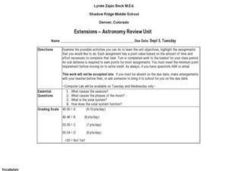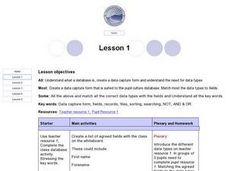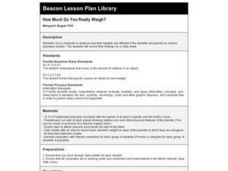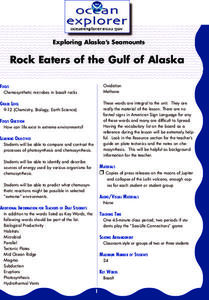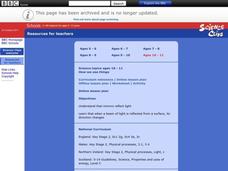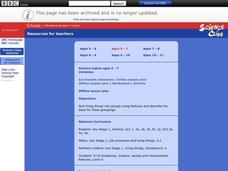Curated OER
Comparing the Satellite and Broadcast Radio Landscapes
Pupils research the development of satellite technology over the last 50 years students explain how the enactment of the Telecommunications Act of 1996 changed the rules for corporate ownership of multiple media outlets.
Curated OER
Extensions - Astronomy Review Unit
Students participate in a review unit in Astronomy using the Layered Curriculum. This allows them to take charge of the type of assessment that is given. The method also allows better differentiation of instruction to occur.
Curated OER
Weather Predictions
Students play the role of weather personalities by making five day forecasts based on data gathered from observations, weather instruments, and weather maps. Each day a small group makes a class forecast for the next day and reviews the...
Curated OER
Fronts
Fourth graders define cold and warm fronts, explain how they are formed and they ways that they affect the weather.
Curated OER
Cold Fronts And Warm Fronts
Students simulate the movement of cold and warm fronts as they listen to a story about the weather and Mr. Sun. They brainstorm the characteristics of each type of front then write about which front they would prefer if they were a...
Curated OER
Comets And Meteor Showers
Students fill in a diagram of a comet. They listen to a short lecture, view flash animation descriptions of comets and meteors and then use the presented information to complete a worksheet.
Curated OER
Database
Second graders collect daily weather information and introduce them to databases.
Curated OER
Space Travel Brochure
Young scholars discover information about the planets and the solar system. They work together to research a specific planet. They develop a brochure for the planet and share with the class.
Curated OER
Finding Out About the Stars and Planets
Young scholars complete a web-based activity to study the planets and solar system. Students complete a number of activities including a slide show that depict the true facts about planets.
Curated OER
Human Needs
Students investigate human needs and how they have adapted to different environments. They complete an experiment to discover the effect of stress on muscles. They use the food pyramid to create a plan for healthy eating.
Curated OER
Inner Planets
Students research characteristics of the planets and record their findings on Planet Web worksheet. They create fold paper to create a foldable booklet to display the information they discover about the planets.
Curated OER
Space - In Your Face or Not?
Second graders, in groups, examine how it doesn't matter if they can see the planets in the solar system or not--they're there.
Curated OER
Watershed Management
Learners investigate the concept of a watershed. They conduct research into the concept using a variety of resources. Students take a field trip to a local watershed to make observations. The outcome is a report concerning the outside...
Curated OER
How Much Do You Really Weigh?
Sixth graders check to see how their weights differ if they weighed themselves on different planets. They record their findings on a data sheet.
Curated OER
Rock Eaters of the Gulf of Alaska
Learners compare and contrast the processes of photosynthesis and chemosynthesis. They identify and describe sources of energy used by various organisms for chemosynthesis.
Curated OER
Ourselves
Students use a website to name and compare external body parts of humans and other animals.
Curated OER
Sound and Hearing - Internet Research
Pupils use a website to help them recognize that sound is generated in a variety of ways and from different sources. They determine that sounds vary in tone and loudness, and learn there are different ways to describe sound.
Curated OER
Moving and Growing
Students know that humans and some other animals have bony skeletons inside their body. They know that other animals have skeletons on the outside of their bodies. They explain the role of both kinds of skeletons.
Curated OER
Helping Plants Grow Well
Pupils explain the effect of water, temperature and light on plant growth.
Curated OER
Micro-organisms
Students examine how micro-organisms are living organisms that are often too small to be seen. They explain that micro-organisms may be beneficial or harmful.
Curated OER
Forces in Action
Students ask questions that can be investigated scientifically. They determine how to plan a fair test by changing one factor while keeping other factors the same, to use measurements to draw conclusions and use scientific knowledge to...
Curated OER
How We See Things
Young scholars explain that mirrors reflect light. They examine how when a beam of light is reflected from a surface, its direction changes.
Curated OER
Variation
Students practice sorting living things into groups using their characteristics. Using pictures of leaves and animals, they sort them based on their color and shape and write the objects characteristics under the picture. They share...
Curated OER
Grouping and Changing Materials
Students feel and observe different types of materials. Using the internet, they sort objects based on the materials they are made from and justify their reasons for putting it in a certain category. They identify objects that could...



